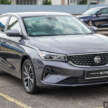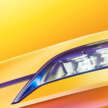According to a report by Australia’s carsales.com.au, Mitsubishi is currently developing an all-new petrol plug-in hybrid system for the latest Triton which made its global debut earlier in July this year. In an interview with Mitsubishi engineering fellow Kaoru Sawase, it was also revealed that a fully electric powertrain won’t come around for at least another five years.
On the matter of the PHEV system for the Triton, the carmaker isn’t providing any details or even a launch date just yet. However, it confirmed that the system will not be related to setups used in existing models like the Outlander PHEV, which uses a transverse powertrain layout as opposed to the Triton that is longitudinal.
Sawase said the Triton will get a “P2 PHEV system” that employs an electric motor between the engine and transmission, with a disconnect clutch allowing for pure electric driving when needed. “Mitsubishi Motors are researching and developing such a [P2 PHEV] system, but at this moment launching time is not decided yet,” he told the media outlet.
He added that the use of a P2 modular design is more in line with the Triton’s requirements to be off-road capable with an allowance for low-range transmissions. “Up to this moment our PHEV technology is transverse powertrain design, based on a front-wheel drive or all-wheel drive,” Sawase said.
“The Triton is a longitudinal powertrain design and also when comparing the Outlander and the Triton, the expected off-road capability level is pretty different. So, basically in order to have an off-road capable vehicle with the current PHEV technology in a Triton-type powertrain, a completely different type is needed, different from Outlander,” he continued, drawing comparisons with the P2 layout used in Land Rover and Jeep vehicles.
As for why Mitsubishi is going with a petrol PHEV powertrain, a Mitsubishi spokesman accompanying Sawase said a diesel version would be too costly. “We totally understand that we have much demands from our core for PHEV with a diesel engine, however, cost-wise that’s impossible,” the spokesman explained.
“Also, when we explore the markets, petrol [engines] are much more easy to introduce to many markets. Diesel is unfortunately now harder to get into markets, this is why [due to] management and business reasons, petrol makes sense,” he added. Ford has already presented the Ranger with a PHEV system, and the BYD Ute with a similar powertrain is expected to be revealed soon.
On the matter of a fully electric Triton, Sawase said current electric powertrains are capable of providing high peak power but limited when it comes to continuous, sustained power delivery. “In order to drive off-road, for example on sand or mud or for driving distances that are very high, in that case we need a continuous output,” he said.
However, other car brands such as Ford, Tesla, Chevrolet, RAM and Rivian have all demonstrated that a fully electric pick-up truck is possible. Despite this, Sawase said a Triton EV isn’t expected for at least another five years.
The post Mitsubishi Triton to get newly developed plug-in hybrid powertrain – EV version at least another 5 years away appeared first on Paul Tan’s Automotive News.




